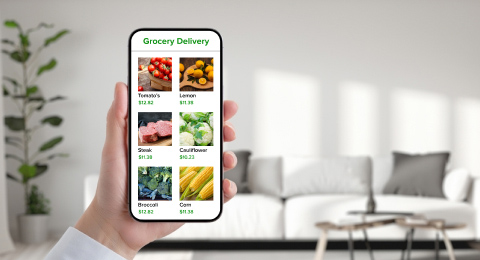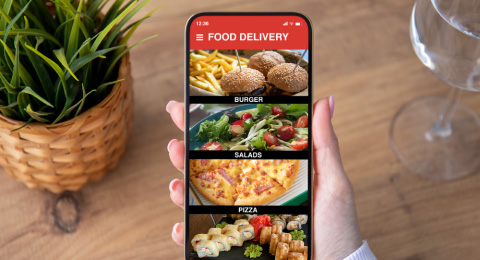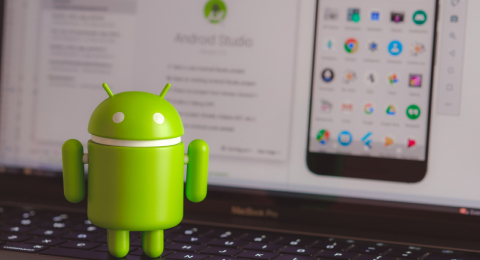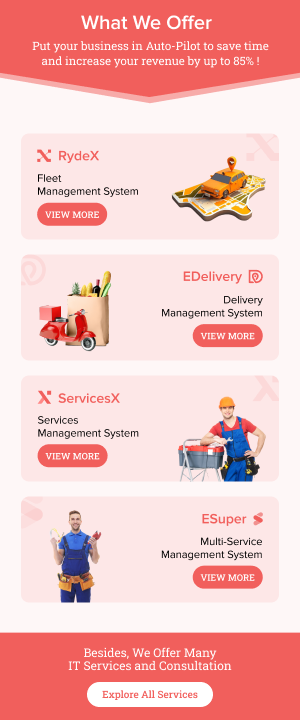
Those days had long passed when programmers used to write multiple codes for different technologies and frameworks. However, choosing a technology stack for a product is a critical stage that directly affects the product’s success, but emerging frameworks, libraries, and languages have made it easy to develop applications. With the emergence of the latest technologies, such as Kotlin and Flutter, it seems like cross-platform app development is experiencing massive growth as half of mobile developers use these technologies because it accelerates time to market.
There has been a surge in interest in cross-platform app development among developers and buyers alike. Because it’s a great alternative for getting semi-native performance without breaking the bank, since they provide faster development and are cost-effective, open-source mobile development frameworks are becoming increasingly popular.
Since so many technologies are available for mobile app development, it has become tricky to pick one. To gauge the developer’s opinion regarding Flutter vs. Kotlin, here we have compared these two trending technologies. In order to help you make the right choice for your next project, we will compare two-cutting edge technologies that allow teams to build apps for different operating systems. Keep reading to find out the plus and minus points of Flutter and Kotlin multiplatform.
Introduction to Flutter
With its release in 2017, the Flutter development kit (SDK) allows developers to create cross-platform apps for mobile and web devices. It is possible to create a cross-platform application with Flutter that works on iOS, Android, Windows, Linux, and other devices.
The Flutter project was launched and maintained by Google, with a growing community supporting it. Unlike most cross-platform frameworks, Flutter uses no widgets or web browser technology. Instead, with this UI toolkit, you can design widgets using a render engine written in the Dart object-oriented language.
The main motto is here to build applications that are used on multiple platforms, as well as on websites. The Flutter framework enables developers to compile an app for three operating systems, including
- Android
- iOS
- Fuchsia

Source: Medium
In this pictorial presentation, you can see how Flutter is immediately gaining the top position in ranking the best application development frameworks due to its capabilities. Hence, if you are a startup and want to build MVP first, hiring Flutter developers would be advantageous for you as it saves time and effort while not affecting the end-product performance.
Overview of Kotlin Multiplatform
It is not universally known that Kotlin is a programming language. As a matter of fact, this is a relatively new programming language developed by JetBrains from Russia. At the Google conference in 2017, Android developers announced that Kotlin natives had received official support for developing Android applications. However, although the language appeared in 2011, it was not successful until recently.
Developed by Czech company JetBrains, Kotlin is a cross-platform programming language. One of its main features is a statically typed programming language with general-purpose capabilities. In addition, a type inference feature is also available. Although it was designed to be interoperable with Java, it has been used in a variety of languages since its development.
The majority of Kotlin development was still done for Android in 2020. However, Kotlin was used in developing 70% of the top 1000 software titles on Google Play, claims Google. Kotlin lets software engineers create mobile apps more quickly than Java because it has a clear, succinct syntax.
Hence, businesses that want to build high-performing apps hire Kotlin developers because it has the potential to handle heavy loads and provide a seamless experience with great stable performance.
Now that we are done with the basics, it’s time to get started with a detailed and technical comparison of these two most-used technologies: Flutter vs. Kotlin.
Head-to-Head Comparison Between Flutter & Kotlin
As said earlier, cross-platform app development is gaining immense popularity. Moreover, amidst the pandemic crisis, enterprises are trying their best to build cost-effective and high-performing apps to survive in the market. These apps also allow organizations to generate revenue and make their strong online presence. But which framework to choose? Which app development technology to choose?
Don’t worry! Here, we are going to compare two of the best technologies that comply with optimum quality standards while saving time, effort, and cost as compared to native app development. Before jumping onto the technical points, let’s have basic information through the following chart.
| Parameters | Flutter | Kotlin |
| Overview | Cross-platform framework launched by Google | Object oriented language targeting JavaScript and JVM |
| Launched By | JetBrains | |
| First Release | 2017 | 2011 |
| Supported Platforms | Android, Google, iOS, macOS, Linux, Windows, Fuchsia | Android, iOS, Windows, Linux, JavaScript |
| Popular Apps | Google Ads, Square, BMW, eBay | Pinterest, Trello, Slack, Evernote |
| App Size | Bigger | Less compared to Flutter |
| Features | Hot reload, fully customized widgets | Interoperability with Java, safe, and functional |
| Status | New as compared to Kotlin | Stable language since its launch |
This is a basic idea about both the popular technologies, but this can’t give you an accurate idea about which technology to use for your app development project. Hence, we will discuss the major technical parameters that distinguish both technologies and help you make a better choice for your product.
Technical Comparison Factors – Flutter vs. Kotlin
This comparison will help you explore similarities and differences between Flutter and Kotlin and also help you determine which is better for your Android app development project. Underneath are some variations that we have observed so far, such as
- Popularity
- Performance
- Learning curve
- UI/UX design
- Time to market
- Backend /frontend capabilities,
- Community support
Let’s elaborate on each of the parameters in detail.
Popularity
Although both Flutter and Kotlin are free and open-source tools, Flutter is more widely used than Kotlin, and its popularity is growing quickly. If we approach it from the perspective of a business visionary, we discover that Flutter has a larger networking size than Kotlin. On GitHub, Flutter has 90.4k leads and 12.1k customers compared to Kotlin’s 31. 3.8k clients and k stars. So, in the comparison of prevalence, Flutter comes out on top.
Winner: Flutter
Performance
The Dart programming language is used in the creation of Flutter apps. These apps are quick because they are instantly compiled into machine code. In addition, it modifies the rendering engine to draw every view component, so it is independent of the web view or the device’s OEM widgets.
Kotlin, on the other hand, is an all-purpose programming language. Java is frequently used as a comparison. However, most Android and cross-platform apps are created using an object-oriented programming language. Performance-wise, Kotlin programs run more quickly and provide greater performance across all platforms.
Winner: Kotlin
Learning Curve
If we use the learning curve as a comparing factor between Kotlin and Flutter, Kotlin comes out on top. It is compatible with Java, which is the cause. Additionally, Google formerly provided a number of Kotlin training classes. The situation is a little bit different when Kotlin Multiplatform and Flutter are discussed, though. Compared to Flutter, Kotlin multi-platform is a nascent ecosystem with few market resources.
The syntax of other programming languages, including Scala, Groovy, Java, and Swift, is comparable to that of Kotlin. Therefore, learning Kotlin from scratch doesn’t have to take a very long time for Kotlin developers.
Winner: Kotlin
UI/UX Experience
Flutter is a simple user interface framework that offers a collection of graphical primitives that are consistent and allow for the creation of extremely expressive user interfaces. It is a brand-new, cross-platform, open-source UI framework that makes programming quick and effective.
The Kotlin user interface is likewise excellent. It may be used to create desktop, online, and native applications. In addition, you may build high-quality code in fewer lines because of its extensive functional programming features. It also works with other platforms like Android and iOS.
Winner: Flutter
Time to Hit Market
In various development environments, such as Visual Studio Code and Android Studio, Flutter is simpler to set up and set up. In addition, its hot reload functionality expedites development by making it simple for developers to view changes made in real time.
On the other hand, mobile application development companies can benefit greatly from Kotlin multiplatform. Nevertheless, Kotlin is widely used by experienced IT services to create specialized mobile apps. Kotlin is also quick, not to mention all of the above.
Winner: Flutter
Backend Capabilities
Flutter is renowned for having stunning UI. It is incredibly simple to use and has many widget modification choices. Although its interface is where it excels, it also has powerful backend features, albeit they can take a little more work to activate.
Kotlin, on the other hand, allows a tonne of flexibility for developers to design and tweak their apps as needed because it is a general-purpose programming language. As a result, it’s an excellent option for creating complicated and large-scale applications that could be a little more challenging to accomplish using a framework like Flutter.
For instance, eBay Motors used Flutter to develop new apps and claimed that they had saved a lot of development time with apps that share almost 98% of their code.

Source: eBay
Winner: Flutter
Community Support
A platform that consistently succeeds in the market is Flutter. In parallel, the Flutter community is expanding. One of the reasons Kotlin is gaining popularity among mobile app developers is that Google is changing to become more Kotlin-centric.
Winner: Draw
What is the Benefit of Flutter?
Constructors are currently available for individuals who require quick and crisis-resilient solutions. Such software (Mobincube, Imshop.io, and others) enables you to quickly and affordably create an application. However, Flutter is not appropriate for projects where productivity and flexibility are crucial, where there are intricate business processes and connections, and where frequent upgrades are anticipated.
For instance, a small restaurant chain would benefit greatly from the function Object() { [native code] }, but if the restaurant wants to increase its sales up to a monthly revenue of more than one million would find it to be incredibly cumbersome to deal with this technology.
In short, Flutter is best for
- Various retail businesses
- Fintech and banking institutions
- Suppliers and franchises,
- Medium to any large business
What is Kotlin Good For?
Experts believe that Kotlin’s simplicity and complete Java compatibility are its two key strengths. For example, a corporation that produces a lot of Java-based goods and is knowledgeable about contemporary development tools developed Kotlin.
The demand for a new language has long been present, but until the introduction of Kotlin, there was no tool that would enable regular Java developers to take the (large) body of ready-made Java code, give them a new tool, and smoothly (but more effectively) continue work.
In short, Kotlin is relevant in the following cases,
- The application should be fast and lightweight
- No need for a cross-platform environment
- The application is a commercial product for the end-user
Pinterest, Trello, Coursera, etc., are the best Kotlin apps examples.
Which is Better? Flutter or Kotlin?
Let us state the obvious: Kotlin, Flutter, and all other app development technologies/platforms are designed to make some of the issues easier to deal with. However, the reality that nothing in our world is flawless and that no one technique can resolve all problems cannot be denied.
Choose Flutter if you don’t need a highly upgraded UI and need to launch the app quickly. It provides end-to-end development, which explains why. Your delight would guide all actions. However, nothing beats Kotlin if you want to develop an optimized and customized user interface that is rich in business logic.
Before you start any product development, we always recommend starting a discussion with an experienced mobile app development company, as it can provide you with a big picture with better ideas and a vision for your future success.










